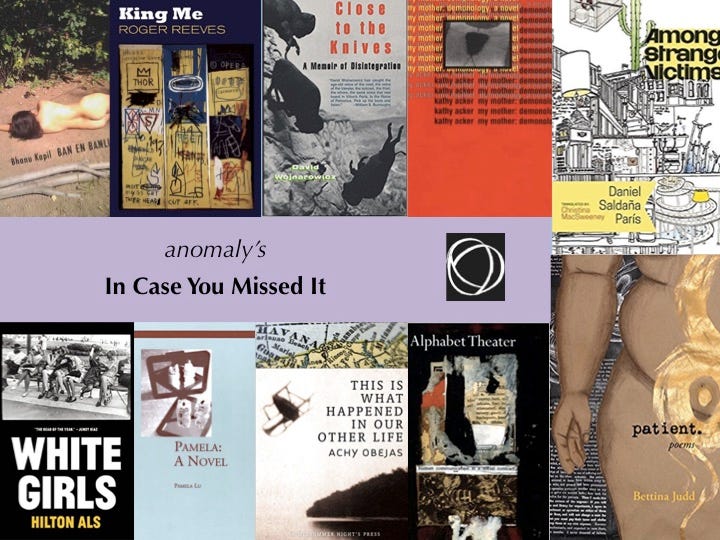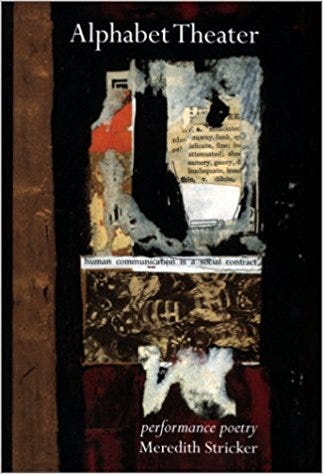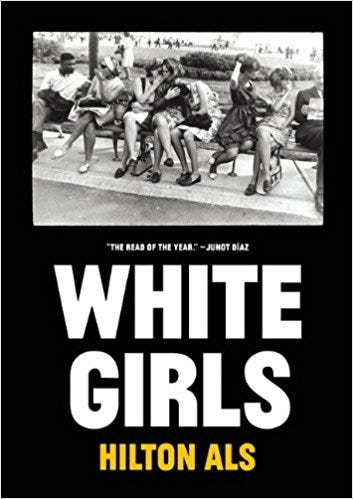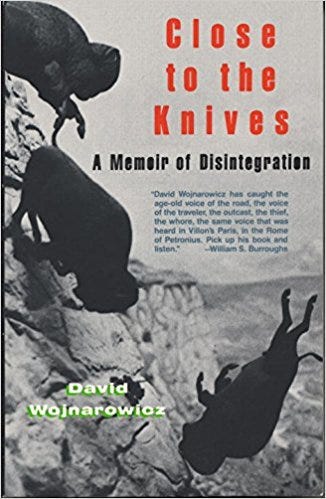It’s that time again! Is your bedside table creaking from all those new books you bought at A̶W̶P̶ Whale Prom? Why not slide out a title from the bottom of your stack? Carefully. Because we’re not doctors, and we’re not responsible for any book avalanches caused by this blast from the recent past. It’s time to put the X-Files on Netflix, and pretend it was the last time you rewatched the X-Files a couple of years ago!

1. BAN EN BANLIEU by Bhanu Kapil (2015)
Could I ask you, or someone else you know, who does not mind getting dirty, to take some charcoal or soot and, casually, smudge the page — and this be my page to submit?
Because nude pages are smudged. Prehensile. Dirty. A way to predict writing but not writing itself.

the gist: How to write a riot? How to be a body in a place one is unwelcome? Two topics next to each other but not quite touching. To begin to approach these questions, Bhanu Kapil bares all. Lies on the ground, smudges nude pages, cuts up notebooks on a butcher’s block, and performs other offerings. In homage to Theresa Hak Kyung Cha; in remembrance of the 1979 race riots in London suburbia. An unwritable book, so instead we gratefully accept these: assembled fragments and notes toward the impossible.
get it from: Nightboat Books
2. THIS IS WHAT HAPPENED IN OUR OTHER LIFE by Achey Obejas (2007)
There are secrets only the body yields,
like vibration,
and kissing, a happy accident
between two women
who have already exhausted all words.

the gist: Pulitzer Prize winner Achy Obejas is better known for her fiction, but this small poetry chapbook is simply stunning. The Sapphic poems in here slow dance, ache with memory and longing.
get it from: A Midsummer Night’s Press
3. KING ME by Roger Reeves (2013)
How much saying nothing
gets you a starling or a jewel.
Gather enough starlings
in a box and you have a factory
of genocide, or merely sound
unraveling like a wing.

the gist: Roger Reeves’ first book won the 2014 Levis Reading Prize. Read him for his fluid self-portraits as. Read him for his moving responses to America’s violent racial history. Read him for his absorption of Whitmanian lyricism.
get it from: Copper Canyon Press
4. ALPHABET THEATRE by Meredith Stricker (2002)
The poor body — fragile as Sappho’s lost
text, taken from her language into
another life? We want to believe
it will never end
it will never end.
Already we are swimming toward
an island we say we can never drown
if life stays alive, we will read
her back to us, whole again, if life
survives us, the body will
be our book and keep on
singing.

the gist: Meredith Stricker’s boldly original mixed media performance poetry captures a choreography of words, their desire. Stricker’s obsessions include homophony, semiotics, bees humming, lost fragments, opera, and desert landscapes. Together, they transport the reader off the page.
get it from: Wesleyan University Press
5. AMONG STRANGE VICTIMS by Daniel Saldana Paris, translated by Christina MacSweeney (2016)
My life is a repetition of one Saturday after another. What’s in between deserves another name. Sundays don’t count: they consist — I’m exaggerating here — of twenty-four wasted hours of which I will remember nothing the following day, and that following day, Monday, marks the beginning of the reign of inertia, whose only function is to carry me along smoothly, as if floating on a cloud of certainties, to the next Saturday.

the gist: An odyssey of the quotidian, Among Strange Victims is a delightfully off-kilter read. Saldaña Paris is witty and sharp in his details as he portrays a slacker hero whose boredom, passivity, and seeming lack of direction give way to adventurous digressions and comic revelations.
get it from: Coffee House Press
6. PAMELA: A NOVEL by Pamela Lu (1998)
R and I turned on the TV to discover a news special devoted to covering an organization of transgendered firefighters and cops… capped with the final bold conclusion that “transexuals and gays are just like the rest of us.” For R and me, this meant that we were just like ourselves, or more accurately, we were just like the “rest of us,” which naturally led to the question of how the “us” had gotten split in the first place.

the gist: Not to be mistaken for that other Pamela (Samuel Richardson’s may be considered the first epistolary novel, but it’s also misogynist and gross) — Pamela Lu’s debut was a genre-defying exploration of self-narration in a postmodern world blurring the line between memoir, lyric, fiction, philosophy, and theory to explore subjectivity and question of difference. It uniquely captures the struggle to create a sense of continuity and to fathom what is “real” in an age of irony.
get it from: Atelos
7. WHITE GIRLS by Hilton Als
I can’t write one complete sentence about her because she was her own complete sentence, and her sentence about herself was better than anyone else’s because she uttered it sort of without thinking while thinking too much, I can’t tell you how unusual that is in a world where, nowadays, no one leaves the house without some kind of script. Still, her brilliance was in part contingent on knowing how the New York City script — a story of youth and ambition and race and blood and money — works and needs to work in order to be a story and therefore of value to other people; the human mind cleaves to details and what-happened-next so it can imagine what happened next, and I haven’t even told you enough of the story so you can imagine who she was and take it from there.

the gist: Lucid and insightful personal and cultural essays that will change how you think about gender and race. Among the titular “white girls”: Flannery O’Conner, Truman Capote, Richard Pryor, Michael Jackson. But the most affecting of the essays is “Tristes Tropiques,” which revels in Als’ deep twinship with Sir or Lady (SL).
get it from: McSweeney’s, 2014
8. CLOSE TO THE KNIVES: A MEMOIR OF DISINTEGRATION by David Wojnarowicz
I’m trying to lift off the weight of the preinvented world so I can see what’s underneath it all. I’m hungry and the preinvented world won’t satisfy my hunger. I’m a prisoner of language that doesn’t have a letter or a sign or gesture that approximates what I’m sensing. Rage may be one of the few things that binds or connects me to you, to our preinvented world.

the gist: In turn lyrical and incisive, artist/writer Wojnarowicz gives testimony to the relation of art and sexuality and the beauty of cruising. But as Wojnarowicz watches friends and lovers die during the AIDS crisis, his prose takes on a searing quality as he excoriates the government’s inaction.
get it from: Penguin Random House, 1991
9. PATIENT. by Bettina Judd
Hospital curtain, showman’s speculum, surgeon’s auditorium. There is an opening here, a thrusting, a climax, a little death. Who will rise from that, and how? Why not stay dead and forget? Why do I choose to remember?

the gist: Who is (a) patient in the name of scientific “discovery”? Bettina Judd’s debut poetry collection spotlights and recovers the narratives of Black women who suffered in the hands of the medical industrial complex, including Anarcha Wescott, Betsey Harris, Lucy Zimmerman, Joice Heth, Saartje Baartman, and Henrietta Lacks. Judd also interweaves her own present-day experiences with medicine. If you liked Tyehimba Jess’s richly polyvocal Olio, you will be drawn into Judd’s testimonies!
get it from: Black Lawrence Press, 2014
10. MY MOTHER: DEMONOLOGY, A NOVEL by Kathy Acker
Dear B, The more I try to tell you everything, the more I have to find myself. The more I try to describe myself, the more I find a hole. So the more I keep saying, the less I say, and the more there is to say. I’m confusing everything between us. I’m not being clear. I don’t want to tell you anything. The only thing that’s possible between us is a car accident. A car accident’s now the only thing that can deliver me from the anguish that’s you. I’m dumb, wild, and I don’t want anyone coming too near me. But the more emotion comes out, the more I want you.

the gist: Twenty years after Kathy Acker died, the past year brought several important books evaluating this gutsy, feminist New Narrative writer’s legacy — including Chris Kraus’s After Kathy Acker and Douglas Martin’s Acker. We took this as an excuse to go back to the source and revisit her novels. Although my mother: demonology is perhaps less known than Blood and Guts in High School, it pulses with political fervor, sex, dream logic, and appropriated found-texts. Always unpredictable, eminently quotable, and redoubtably lyrical.
get it from: Grove Press, 1994
ICYMI: Praise for Books You Meant to Read — April 2018 was originally published in Anomaly on Medium, where people are continuing the conversation by highlighting and responding to this story.
